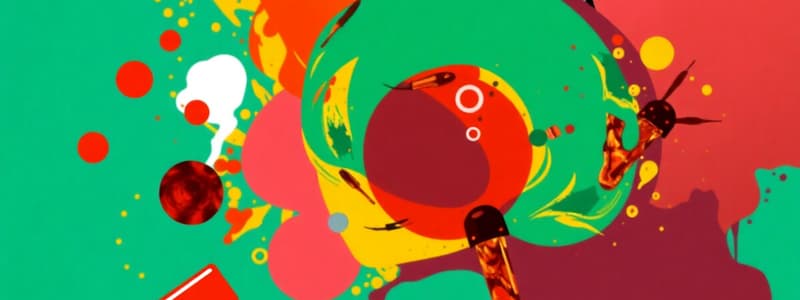Podcast
Questions and Answers
Addiction is defined as the state of being determined or controlled by something else.
Addiction is defined as the state of being determined or controlled by something else.
False
Drug abuse refers to the use of drugs outside or beyond the permitted medical practice.
Drug abuse refers to the use of drugs outside or beyond the permitted medical practice.
True
Dependence is synonymous with addiction and refers solely to psychological effects.
Dependence is synonymous with addiction and refers solely to psychological effects.
False
Abuse potential pertains to drugs used in medical situations only.
Abuse potential pertains to drugs used in medical situations only.
Signup and view all the answers
A chronic brain disease characterized by compulsive drug seeking and use is known as drug addiction.
A chronic brain disease characterized by compulsive drug seeking and use is known as drug addiction.
Signup and view all the answers
Habit is defined as a constant inclination to perform an act without any frequency of repetition.
Habit is defined as a constant inclination to perform an act without any frequency of repetition.
Signup and view all the answers
All drugs that have psychoactive effects are classified as having abuse potential.
All drugs that have psychoactive effects are classified as having abuse potential.
Signup and view all the answers
The level of regulatory control for a substance is independent of its abuse potential.
The level of regulatory control for a substance is independent of its abuse potential.
Signup and view all the answers
The psychological effects of drug use do not contribute to drug dependence.
The psychological effects of drug use do not contribute to drug dependence.
Signup and view all the answers
Non-medical consumption of drugs refers to drug abuse.
Non-medical consumption of drugs refers to drug abuse.
Signup and view all the answers
Study Notes
Course Information
- Course name: NFNF 3512 Introduction to drug abuse and addiction
- Course coordinator: Nor Syafinaz Yaakob
- Email: [email protected]
Course Overview
- Final semester exam: 60%
- Presentation: 20% (Live 10% + Video 10%)
- Reflection writing: 10% (Based on site visit)
- Written report: 10% (DAA law case)
Definitions
- Addiction: compulsive or uncontrollable use; enslavement
- Abuse: wrongful or improper use
- Habit: constant, often unconscious inclination to perform an act, acquired through repetition
- Dependence: being determined, influenced, or controlled by something else; subordination; required for normal physiological or psychological function
- Abuse potential: drug used in non-medical settings, repeatedly, or sporadically, for positive psychoactive effects; characterized by CNS activity; determines regulatory control
Drug Addiction and Drug Abuse
- Drug addiction: chronic, often relapsing brain disease causing compulsive drug-seeking and use, despite negative consequences.
- Drug abuse: non-permissive consumption of certain substances (drugs) that can have specific effects on individuals; chronic use may lead to physical and psychological dependence. It is also the use of licit or illicit drugs outside or beyond permitted medical practice or justification.
About NADA
- The National Anti-Drugs Agency (NADA) is the lead agency under the Ministry of Home Affairs in Malaysia.
- NADA combats drugs and substance abuse through: Preventive drug education, Enforcement and Security Programme, Treatment, Medical and Rehabilitation Programme, and International relations.
NADA Vision, Mission, and Objectives
- Vision: Drug-Free Malaysia
- Mission: Leading agency in combating drugs
- Objectives:
- Prevent drug involvement
- Treat and rehabilitate drug addicts
- Prevent addiction relapse
- Eradicate drug supply, trafficking, and abuse
Overall Malaysia Statistics (2020)
- Total Drug and Substance Abusers and Addicts: 128,325 individuals
- Gender:
- Male: 95.5% (122,561 individuals)
- Female: 4.5% (5,764 individuals)
Age Category (2020)
- Adolescence (13-18 yrs): 2.0% (2,556 individuals)
- Youth (19-39 yrs): 65.0% (83,401 individuals)
- Adult (≥ 40 yrs): 32.9% (42,211 individuals)
- No Information: 0.1% (157 individuals)
Ethnicity (2020)
- Data on ethnicity and percentages of drug abuse provided
Academic Qualifications (2020)
- Primary school education: 8.1 %
- Secondary school education: 59.4%
- Tertiary education: 3.3%
- No schooling/ never attended school: 29.2%
Occupation (2020)
- Data on occupation and percentages of drug abuse provided. (i.e. Unemployed, Private sector, Self-employed, Part time worker, General worker, No occupation, Government, Student, Retiree)
Type of Drugs (2020)
- Amphetamine-Type Stimulants: 65.2% (83,698 individuals)
- Opiates: 30.8% (39,547 individuals)
- Cannabis: 2.7% (3,396 individuals)
- Others: 0.8%
Additional Information
- URLs for further information about Amphetamine-type stimulants, Cannabis, and Heroin & Morphine
- Statistics on initial reasons for using drugs (2014-2019)
- Cure & Care Clinic, Cure & Care Rehabilitation Centre, Cure & Care Service Centres, Caring Community House, Cure & Care Vocational Centre, Client integration centre, Baitul Islah, Halfway house, District NADA Office, District Drug Rehabilitation Committee (Treatment & Rehabilitation data)
Studying That Suits You
Use AI to generate personalized quizzes and flashcards to suit your learning preferences.
Related Documents
Description
This quiz covers key concepts related to drug abuse and addiction as outlined in the NFNF 3512 course. Explore definitions, distinctions between addiction and abuse, and the implications of drug dependence. It's essential for understanding the complex nature of substance use disorders.




